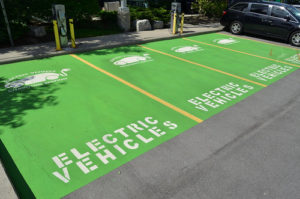These days, car buyers can choose a vehicle with a traditional gas engine, a fully electric vehicle, or a hybrid vehicle, which uses both gasoline and electric charge. If you’re considering a new car, truck, or SUV, learning about electric vehicle batteries can help you decide whether this type of vehicle is right for you. Keep reading to find out more information about electric car batteries, including what types of batteries exist and how manufacturers make them.
What Is an Electric Vehicle Battery?

EV Charging Stations by Open Grid Scheduler / Grid Engine is licensed with CC BY 2.0
An electric vehicle battery powers both fully electric and hybrid vehicles. In fully electric vehicles, the battery provides all of the power to the car’s engine. In hybrid vehicles, the battery works with traditional fuel to power the car. Both types of batteries require charging, either at home or at a licensed electric vehicle charging station. Different types of charging stations take varying amounts of time to fully charge an electric vehicle battery, but a slower charge is often better for the battery’s longevity.
What Are the Main Types of Electric Vehicle Batteries?
There are three main types of batteries that manufacturers use to power electric cars:
- Lithium-ion batteries are the most common type of electric vehicle battery because of their low weight and their ability to generate lots of energy per charge. While they don’t have as long a lifespan as some of the other battery types, they’re usually made of recyclable parts, making them more sustainable.
- Nickel-metal hydride batteries are often found in hybrid vehicles because they’re expensive to make and generate a lot of heat. They’re reliable, but constant use makes them wear out quickly, so they’re ideal for a hybrid vehicle where they’re not used all the time.
- Lead-acid batteries are often used as backup energy storage units for other types of batteries. They’re inexpensive and reliable, but they don’t last long or function well in extreme temperatures, which makes them less desirable for use as a primary battery.
What Are the Requirements for a Good Electric Vehicle Battery?
When making a new electric vehicle battery for a car, truck or SUV, a manufacturer’s engineering team considers the following criteria:
- Energy efficiency: A battery’s energy efficiency is the measure of how much power it generates for every charge. Cars with high-efficiency batteries get more miles per charge.
- Longevity: Batteries that last longer are more cost-effective for drivers, which can increase the popularity of certain electric vehicle models. Longevity takes into consideration the length of time the battery works and the number of charges it can take.
- Self-discharge rate: The self-discharge rate of a battery is the amount of power it loses due to internal reactions within the battery. A battery with a high self-discharge rate will retain less power per charge over time, making it less efficient.
- Weight: While bigger batteries might provide extra power, they’re often heavier, which adds to the weight of the vehicle. Engineers have to balance the benefit of additional power against the downside of a heavier car battery.
- Temperature performance: Some types of electric vehicle batteries are less effective in extreme heat or cold, which makes them less useful for drivers who live in certain climates. To sell an electric vehicle across the world, manufacturers need batteries that can withstand rapid temperature changes and extreme temperatures.
How Are Electric Vehicle Batteries Made?
The first step in making an electric vehicle car battery is to extract the different materials that make up the battery, like lithium, cobalt, and nickel. The materials used depend on the type of battery. Then, workers in specialty factories turn the raw materials into battery cells containing two metallic terminals called the anode and cathode, and a substance called an electrolyte. The electrolyte carries current between the anode and cathode, creating electricity. For example, in a lithium-ion battery, lithium ions move through the electrolyte between the anode and cathode.
Manufacturers often buy vast amounts of battery cells from third-party companies, though some manufacturers create their own batteries in specialized plants. Each battery cell can create a small amount of electricity, but it takes a lot of them to generate enough power to move a car. An electric vehicle’s battery might contain hundreds or even thousands of individual battery cells. Engineers usually group battery cells into modules to make them easier to install. An electric vehicle battery contains several modules, a cooling apparatus, and a battery management system, which communicates with the rest of the vehicle’s systems.
How Are Electric Vehicle Batteries Different from Conventional Car Batteries?
The biggest difference between an electric vehicle battery and a conventional car battery is the type of engine it powers. While a traditional car battery is linked to an internal combustion engine, an electric vehicle battery is connected to an electric or hybrid engine. Here are some other major differences between these two battery types:
- Price: Electric vehicle batteries are usually more expensive than conventional batteries for cars with an internal combustion engine. However, many electric vehicle manufacturers cover battery replacements in their limited warranties.
- Availability: Electric vehicle batteries are usually harder to find in traditional auto part stores because they’re not made to be replaced often. You might have to contact your manufacturer for a replacement.
- Longevity: Generally, electric vehicle batteries are more durable than conventional batteries and can last up to eight years, or 100,000 miles. Heavy use, consistently hot conditions, and charging from zero to full often can cause the battery to degrade more quickly.
Well, there you have it. We have given you all the information you need to know about electric vehicle batteries. If you’re looking for a car, truck, or SUV to take you on your next adventure, Huffines CDJR Plano is here to help. We’ve got a full inventory of new Chevys, Dodges, Jeeps, and Rams, along with a selection of high-quality used vehicles. Stop by our lot to talk to a team member about your next set of wheels.




